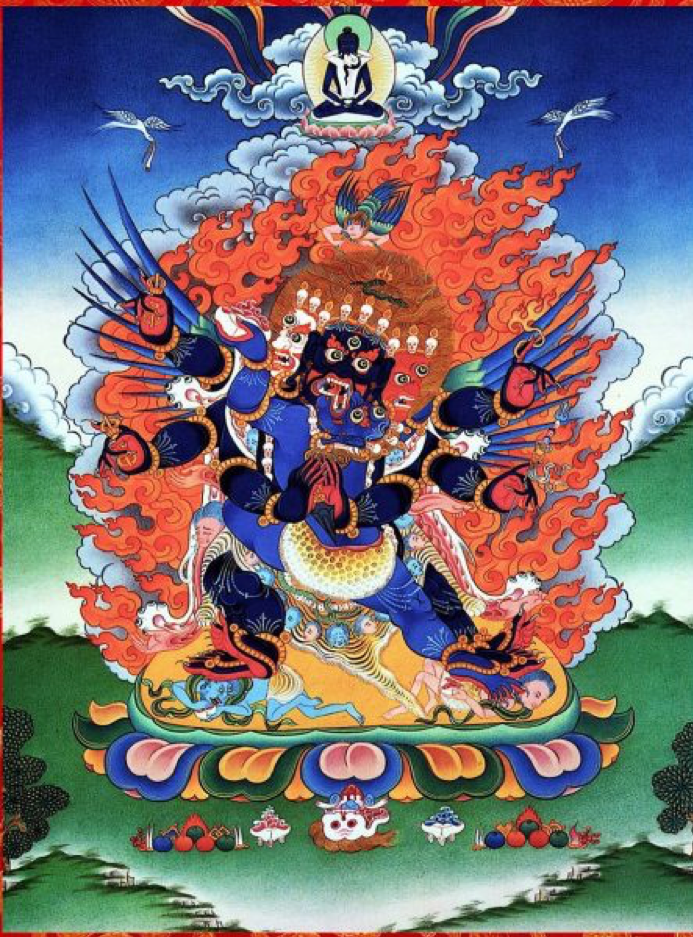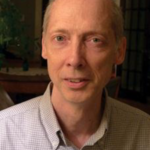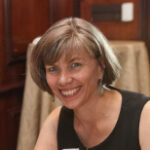The Wisdom Weapon of Compassion: A Vajrakilaya Retreat
with Loppon Lodro Dorje and Karen Porterfield
November 6 - 23, 2025
THE WISDOM WEAPON OF COMPASSION: A VAJRAKILAYA RETREAT
With Dorje Loppön Lodrö Dorje and Karen Porterfield
A Foundational Yidam for Gaining Realization and for Engaging a World in Turmoil
From HH Dilgo Khyentse Rinpoche’s commentary:
“The wisdom mind of the Buddhas is naturally permeated by all-encompassing compassion, the essence of emptiness.
Like a sharp weapon, this great compassion has the power to sever all the obscuring emotions and suffering of sentient beings.”
From the Netik Phurba sadhana:
“The vajra space of suchness
Raging against whatever opposes compassion
Cuts the kleshas, aggression, and grasping and fixation. . .
Obstacles, maras and obstructing spirits are completely annihilated.
The environment and its inhabitants are (returned to) innate primordial purity.”
Background
In our community, the practice of Vajrakilaya has a long history which began with the Vidyadhara’s intentions for his students’ path and the subsequent abhishekas offered by HH Dilgo Khyentse Rinpoche at the time of Trungpa Rinpoche’s parinirvana. Since that time, the abhisheka has been offered by Dzongsar Jamyang Khyentse Rinpoche, Sakyong Mipham RInpoche and, most recently, Rabjam Rinpoche. While many community members received the empowerment and have practiced the sadhana in groups, the opportunities to deepen their understanding and connect more fully have not been plentiful. This program is designed to provide such an opportunity. We aim to continue the support for Vajrakilaya practice so auspiciously provided recently by the retreats led by Larry Mermelstein and Eve Rosenthal.
The Program
New and seasoned Vajrakilaya practitioners are welcome to attend, and can consider this a practice intensive. For those wishing to accumulate time or numbers toward accomplishing the Vajrakilaya retreat commitment, this time–or the numbers one accumulates–will count. (If one is beginning the retreat commitment, for example, this two-week practice will serve as completion of the first recitation.) We will follow the traditional model of four sessions per day. Included in the schedule will be regular opportunities for teachings and discussion, as well as exploration of our lineage teachers’ commentaries in the Vajrakilaya Practice Manual.
Vajrakilaya is held as a principal yidam and is practiced widely in the Nyingma, Sakya, and Kagyu schools. Just as Vajrayogini and Chakrasamvara are foundational yidams supporting the Kagyu transmission of mahamudra, Vajrakilaya is a foundation and complement for atiyoga training. Vajrakilaya practice includes all the union and inner yoga potentials of Chakrasamvara, and unites it with the lungta and warrior principles of Shambhala. We might say this is an esoteric aspect of the very skillful and profound Shambhala upayas, or skillful means, the Dorje Dradul introduced.
The Vidyadhara fully intended us to engage this practice for its own sake, and also because of its direct connection with the Ashe principle in his Shambhala transmission.
The practice of Vajrakilaya is timely. In this time of unusual aggression and chaos in the world, this practice is aimed at addressing just this kind of circumstance.
Who Can Attend
Participants must have received the Vajrakilaya abhisheka–specifically, from the Netik Phurba terma tradition of Jamyang Khyentse Wangpo–as offered to us by HH Dilgo Khyentse Rinpoche, Dzongsar Khyentse Rinpoche, Sakyong Mipham RInpoche and Rabjam Rinpoche. We welcome all who are qualified to join us–the new and the more seasoned.
Ideally participants will have completed the Chakrasamvara practice retreat commitments or have some experience of Chakrasamvara teachings and practice. Those who have completed both fire offerings for Vajrayogini may request special permission to attend.
If you have any specific questions about the retreat or your eligibility to attend, please contact Karen Porterfield at [email protected].
What to Expect
The program will follow the traditional four-session daily practice schedule with regular opportunities to explore the view and practice through discussion. Practice sessions will be a combination of umdze-led (during feasts and afternoon protector practices) and self-led (during most daily sessions). For those who want to lean into the retreat aspect of the program, opportunities may exist to complete most of the practice in the isolation of one’s room or cabin. [Single Occupancy Lodging required if you will be choosing this practice option. Also leave a note in the comments when registering.]
We will use the Vajrakilaya Sadhana and the Vajrakilaya Sadhana Practice Manual for the retreat. These can be purchased from Nalanda Translation at Nalanda Translation.org. Though there will be time for discussion, if you are new to the practice, you should at least be familiar with the Daily Yoga practice beforehand. For those who have not undertaken the Vajrakilaya retreat, this program will offer training to support one’s future retreat practice.
Partial Attendance
If you have the prerequisites and abhisheka for the Vajrakilaya Sadhana but cannot attend the full program, you are welcome to come for part of the retreat. However, we request you come at the beginning of the retreat.
To attend part of the retreat, please follow the registration process and write the nights you will be spending at DDL in the comments section. We will adjust your Guest Statement to reflect your plans.
Retreat Cost
All prices are in $CAD. Please consider paying by e-transfer, cheque, or cash. Saving credit card transaction fees helps us keep the Centre going.
Tuition & Meals: $1,435
Lodging: Extra: varies by type. Visit the Registration Form or this page for a list of options and pricing.
Single Occupancy Lodging is reduced by $20/night for this retreat.
Early Bird Discount of $100 applies if you register by August 8, 2025.
Generosity Policy: We have a donor-supported pay what you can policy and scholarships available. If you have questions or would like to set up a payment plan, contact our Finance Department at [email protected].
Registration and Cancellation Policies
Please take note that our registration and cancellation policies have been updated. You can read our registration and cancellation policies here.
Useful Links
What to Bring & Expect at DDL
How to Get Here
Leaders
After a stint pursuing theology, then physics, and then computer programming, Lodro Holm became a student of the Chogyam Trungpa Rinpoche in 1971, and moved to Boulder to join the Karma Dzong community there. Under Trungpa Rinpoche’s direction, Loppon Lodro Dorje was head of the Office of Three Yana Studies from 1976 through 1990, which facilitated the meditation practice and study of the three yanas for Vajradhatu students. As a founding member of the Nalanda Translation Committee he was fortunate to work with the Druk Sakyong on both Buddhist and Shambhala texts. In 1985 the Vidyadhara designated him Dorje Loppon…
Learn more about Loppon Lodro Dorje
Karen became a Buddhist in 1984 in Bodh Gaya, India, with Chökyi Nyima Rinpoche. After receiving teachings from Tulku Ugyen Rinpoche, she continued her studies with many prominent Nyingma and Kagyü teachers over the next few years before landing in Boulder, where she became a student of Chögyam Trungpa Rinpoche. Since then, she has followed the practice path he laid out, recently completing her Vajrakilaya retreats. For over thirty years, she has taught and led programs in Shambhala East Coast centres, as well as serving in various administrative roles including head of Practice & Study and of External Affairs for…
Learn more about Karen Porterfield




